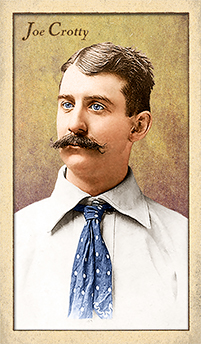
- Series: 1880s: Spotted Ties
- City: New York
- Team: Metropolitans
- League: American Association
Joseph P. Crotty (1860-1926) was a catcher in two leagues: the American and Union Associations. He was in these organizations with 4 clubs from 1882 to 1886. Before, during and after these years in the “major leagues,” Crotty floated among numerous minor league franchises including the Sioux City Corn Huskers in whose uniform he appeared in the Old Judge series for 1889. A journeyman receiver, Crotty had a typically anemic batting average (.170 in MLB) but fared 100 points higher when in the lower echelons. His career did allow him to see the country: as far east as Syracuse, south to Jackson and west to Helena. Joe’s initial year, 1882, was also a year of firsts for his two clubs. He began in Louisville with the new Eclipse squad and then was picked up by Chris von der Ahe’s St. Louis Brown Stockings. This enabled him to be present at the creation of the Cardinals as the controversial owner brought the team into the American Association.
- Joe’s other ML clubs were the Cincinnati Outlaw Reds and the NY Metropolitans
- The Reds played in the UA’s only season, 1884, affording Crotty another chance to make a kind of history
Auction History
Cartophilia
Old Judge Pose: 102-1
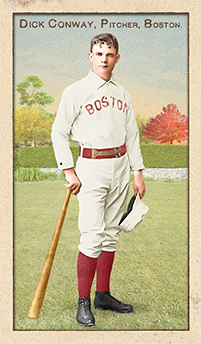
- Series: Beginnings: 1880's
- City: Boston
- Team: Beaneaters
- League: National League
Richard Butler Conway (1865-1926) earned quite a reputation for toughness in his native Lowell, MA and the New England League. Although his reliance on his off-speed pitches signaled a short career in the majors (in an era when the heater dominated from fifty feet), Conway's overhand fastball clocked Bill McGunnigle, fracturing his skull and ending a playing career for the future National League manager. The reputation may have stemmed less from the beaning than the fact that it was the third straight high hard one that decked Mac at Brockton that summer of 1885.
Conway was signed to his first major league contract with the American Association's Baltimore Orioles in 1886 but was soon returned to the minors. He got a big break after pitching his Portland team to a win in Boston against the Blues who shared the South End Grounds with the Beaneaters, bringing him to the NL's attention. Boston hired him for the '87 campaign. The Globe faulted his reliance on his curve and “using his arm entirely....He fails to get any speed on the ball and much strength is wasted.” Nevertheless, Dick's debut showed promise and the same paper lauded his effective control and all-around play. After going 5-1, the league caught on to him and he finished 9-15.
- Plagued with a sore arm, Conway ended his two-plus years MLB tenure with a 15-24 record and 4.78 ERA
- Dick was part of a “brother battery” with older sibling Bill with the '86 Orioles, among only sixteen such pairings in the majors
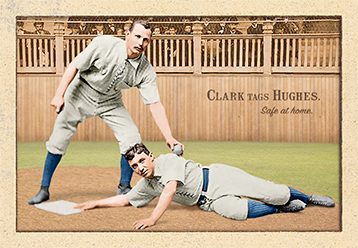
- Series: 1880s: Diamond Duos
- City: Brooklyn
- Team: Bridegrooms
- League: American Association
Bob Clark:
Robert H. Clark (1863-1919) cut his teeth in the fierce baseball rivalries between his native Covington KY and neighboring Cincinnati. He was enjoying a fine rookie season with Atlanta but caught the attention of the scouts when he was dragooned into catching after an injury to the starter. Bob came up with Brooklyn in 1886 and found great success there, handling all the staff. Bob was praised by the NY Clipper in ‘88 as one of the Bridegrooms’ most valuable players. During his five seasons in NY Clark hit a fine .241, but saw his average plunge after leaving Brooklyn in ‘91 for part time duty with Cincinnati and Louisville for one year with each club. Undoubtedly, Clark’s career highlights were the two Brooklyn pennants, first in ‘89 in the American Association and the following year when the franchise joined the National League.
- Clark died tragically from a fire back home in Covington at age 56
Mickey Hughes:
Michael J. Hughes (1866-1931) got 25 of his three-year career total 39 wins for the Brooklyn Bridegrooms in his rookie season, 1888. That performance earned Hughes the opening day start for Brooklyn in 1889, but he fell to a lackluster 9-8 record that year. Hughes was traded to the Athletics in 1890, finishing his brief ML tenure going 1-3 in six games.
- In Brooklyn’s final year in the American Association, Hughes went 1-0 in the 1889 Series against the NY Giants, won by NY 6 games to 3
Auction History
Cartophilia
Old Judge Pose: 76-6
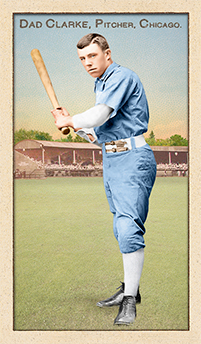
- Series: Beginnings: 1880's
- City: Chicago
- Team: White Stockings
- League: National League
William H. Clarke (1865-1911) learned early why the major leaguers get the big bucks: he had uniformly outstanding success on the mound in the minors with an overall 1.81 ERA. Things were always tougher with the big clubs: an ERA of 4.16 and a journeyman record of 44-51 during seven seasons. Dad’s best year came with the Giants in 1895 where he won 18 with a 3.39 ERA. Things must have looked different when he came out of Lorain, OH to the Sandusky Suds in 1887 winning 21 with a rookie ERA of 1.13. Similar results followed in Des Moines and Omaha. Clarke even got to do a turn out west with the San Francisco Haverlys and a short stay with the Jacksonville (IL) Lunatics where it must have maddened him to go 3-3 despite a 0.87 ERA. Always a strong-willed character (the nickname reflected a grizzled visage), Dad sparred and stormed through a long up-and-down career.
- Per SABR, Dad’s innovative “system” of pitching “slants” influenced Big Train Johnson to perfect his own motion
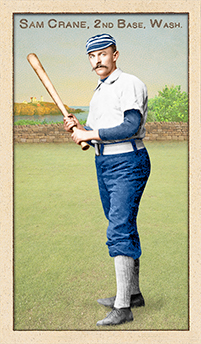
- Series: Beginnings: 1880's
- City: Washington, D.C.
- Team: Nationals
- League: National League
Samuel Newhall Crane (1854-1925) played second base for eight major league teams in three leagues from 1880-90. Sam lacked power (three career HRs, .203 average) despite a sturdy 6’, 190-lb frame. He was only a little more adept stealing bases (25 over the decade). Somehow, the practice of thievery on the bases carried over into Sam’s private life and his mediocre tenure in the big leagues ended ignominiously when he was accused of stealing a local merchant’s cash and wife. Such a checkered past was no hindrance to a longer career as a sportswriter. True to his tarnished image, Sam was mired in controversy as a scribe, getting himself barred from the Polo Grounds after attacking Giants’ owner Andrew Freedman in print. Whatever unpaid debts Crane left on the field or in the press box, he more than made up for by becoming an early and ardent promoter of creating a “memorial” to past stars of the game in Cooperstown, NY. His and others' efforts eventually led to the establishment of the National Baseball Hall of Fame in Cooperstown in 1939.
- Crane’s ouster amid the “circus” atmosphere surrounding the Giants made him a brief cause celebre among journalists aghast that one of their own should be censored
- Crane's uniform color on this card was changed in February, 2017 from black to blue to reflect recent reliable research by Craig Brown & friends at Threads of Our Game. Two cards had been previously released featuring a black uniform.




